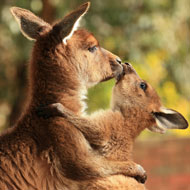Why caring for young is not shared equally between the sexes

Inequality between the sexes can be explained by the cost and benefit of caring for young.
Scientists have unlocked clues as to why the burden of caring for young is so unequally shared between the sexes in many animal species.
According to Bristol researchers, small differences initially predispose one sex to provide more care. It then evolves to develop attributes that enhance its ability to care for young - for example mammary glands in female mammals or increased brain size in some fish. As a result, that sex will then provide most or all of the care.
John McNamara from the University of Bristol explains: "The sex with the lower cost or higher benefit of care evolves to both be more able to care and to provide much higher levels of care than the other sex."
In many mammals, care is provided by one parent only, yet with birds, this is often undertaken by both parents.
Caring for young is costly to the parent, therefore it is most beneficial for each parent if their partner takes on this responsibility.
Professor McNamara says the inequality between the sexes can be explained by the cost and benefit of caring for young.
One key factor is the certainty of parentage. Usually the less certain parent is the male, which decreases the benefit for him of caring for the young.
Sexual selection is another driving force. For the sex that can mate again more quickly, this increases the burden of caring for young.
However, Prof McNamara used a modelling approach in his research to show that even in the absence of these factors, we can expect to see substantial differences in the care offered by each sex.



 The BSAVA has opened submissions for the BSAVA Clinical Research Abstracts 2026.
The BSAVA has opened submissions for the BSAVA Clinical Research Abstracts 2026.